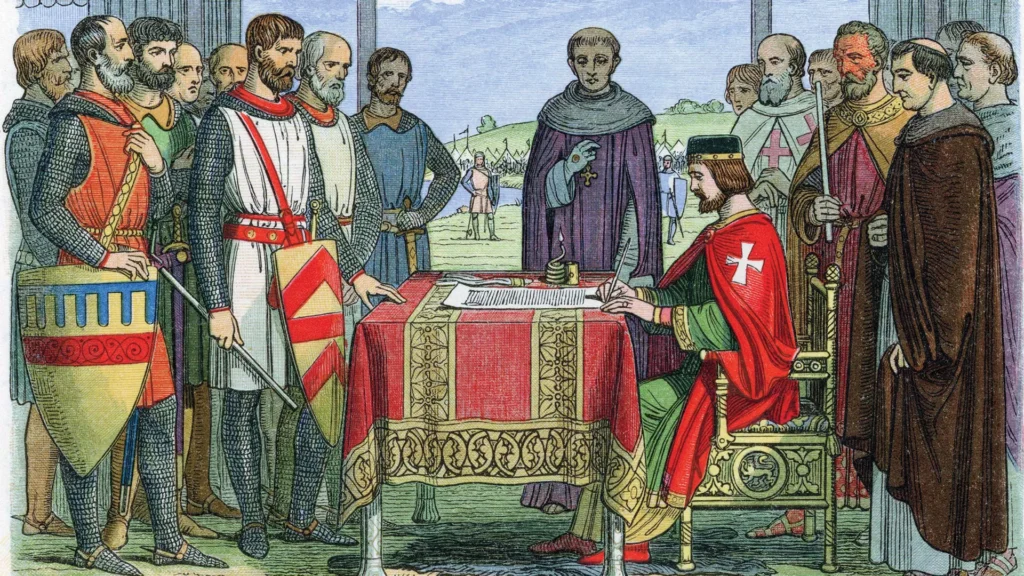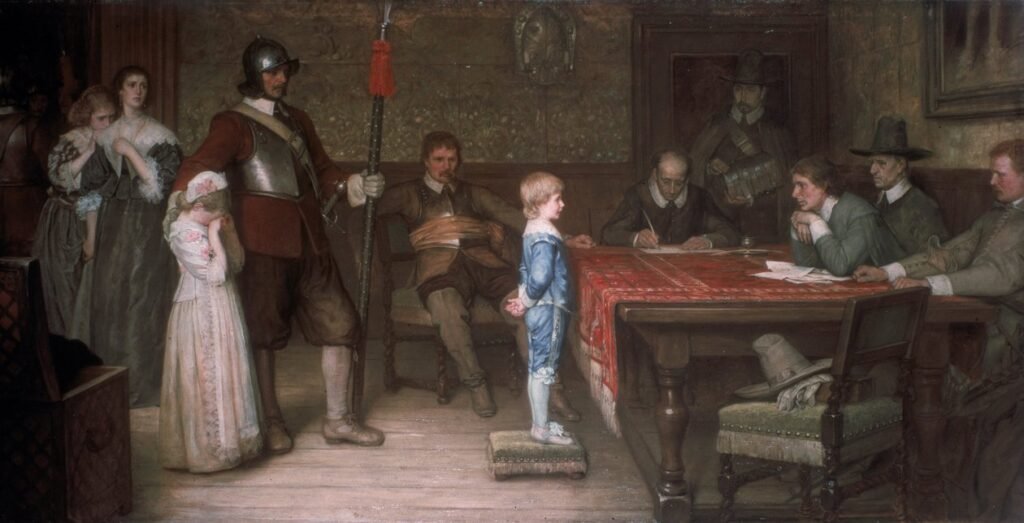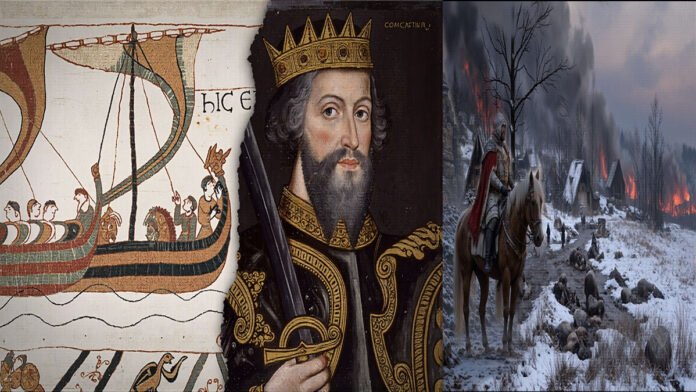From 1066 to Starmer: The Norman Yoke Never Lifted
When the establishment celebrates symbols of oppression, the working class should ask why.
So France is lending Britain the Bayeux Tapestry, a so-called “powerful symbol” of our shared history. Politicians are calling it a grand gesture, a moment of cultural celebration between nations. The media gushes about this “priceless treasure” coming home.
But let’s not be duped by state-sponsored PR campaigns wrapped in silk and symbolism. The Bayeux Tapestry isn’t just art, it’s a banner of conquest, a stitched account of how Norman invaders subjugated England, tore up its customs, and stamped feudalism onto the backs of the common people.
Let’s call it what it is: an artefact of imperial violence, and a visual record of a hostile takeover that changed English society from the ground up, for the worse.
Before the Normans: Elected Kings, Local Power, and Peasant Rights
Prior to 1066, England was no utopia, but it was a far cry from the brutal feudalism that followed. Anglo-Saxon England had systems of local governance that gave common folk a voice. Kings were elected through the Witan, an assembly of nobles and clergy who, yes, chose only from royal bloodlines, but still had the power to accept or reject a monarch. Power flowed both ways.
Land ownership wasn’t centralised in the hands of a few. Peasants (ceorls) could own land and weren’t automatically bound to serve a lord. There was genuine social mobility; a peasant could rise through service or trade. Commoners had legal rights and freedoms that would vanish under Norman rule.
Anglo-Saxon law prioritised compensation over punishment, aiming at communal restitution rather than state dominance. Local courts handled disputes, and communities had genuine say in their governance. The concept of “bookland”, land held by charter, meant even small farmers could have secure tenure.
It wasn’t perfect, but it was recognizably more democratic than what followed.
The Conquest: Genocide and the Birth of English Serfdom
Then came the Normans with their horses, swords, castles, and bishops, and within a generation, England’s common folk were shackled. William the Conqueror’s campaign, particularly the Harrying of the North, amounted to genocide: entire villages burned, tens of thousands starved, the North laid to waste for years.
This wasn’t just warfare, it was class war, medieval-style.
What followed was the wholesale introduction of serfdom. Free peasants became villeins, tied to the land and their lord’s authority. Justice? That now belonged to the barons. Land? Carved up and handed to Norman nobles and the Church. English customs and laws were replaced by French aristocratic rule and a rigid class structure designed to keep the peasantry in their place for centuries.
The Domesday Book of 1086 tells the story: a comprehensive survey of England’s wealth, designed not for governance but for extraction. Every village, every animal, every peasant catalogued for Norman exploitation. It was the medieval equivalent of a corporate takeover, assets stripped, workforce enslaved, profits exported.
The Long Fight Back: From Magna Carta to the Charter of the Forest

It took generations for the English people to claw back even a sliver of power. The Magna Carta in 1215 wasn’t written for peasants; it was a document signed under duress by King John to appease rebellious barons, but it set a precedent. It acknowledged that even kings weren’t above the law, and more importantly, it planted the seeds of resistance to arbitrary power.
It enshrined one of our most basic liberties: the right to trial by jury, a principle that, until now, was considered untouchable. But here’s the bitter irony: Keir Starmer’s Labour government is now considering proposals to reduce jury trials in England and Wales, ostensibly to tackle court backlogs. That’s right, one of our oldest rights, secured in the Magna Carta, is on the chopping block under a party that once claimed to stand for civil liberties.

The Leveson review is considering removing this ancient safeguard for more and more offences, replacing community justice with bureaucratic expediency. It’s another quiet step towards the dystopia Britain is sleepwalking into, one where liberty is just another budget line to be cut.
But it was the Charter of the Forest, signed two years later in 1217, that mattered most to common people. It returned access to woodlands and grazing rights to the people, rights that had been stripped by Norman kings and reserved for the elite. It was an early victory in the long fight for common ownership and against enclosure.
The Charter declared that “all men” could have access to the forest’s resources, not just the nobility. It was a radical assertion of common rights against aristocratic privilege, the kind of principle that terrifies power today just as much as it did 800 years ago.
The Diggers: Socialism in Action

The spirit of resistance flowered most brilliantly in the Diggers, who emerged between 1649 and 1650 as a radical response to post-civil war upheaval. Their beliefs and deep-felt hankering for liberty from the perpetual “Norman yoke” were revolutionary, the product of an epoch in which traditional post-conquest society had been undermined.
The Diggers took direct action, occupying and farming common land at St. George’s Hill in Surrey, declaring the Earth a “common treasury for all.” Their leader, Gerrard Winstanley, wrote: “The earth was made to be a common treasury for all mankind… not to be bought and sold among men.”
They were brutally suppressed by local landowners and the army, but their spirit lived on in every working-class movement that followed. From the Levellers to the Chartists, from the suffragettes to the striking miners, the same cry echoes: the land belongs to all of us, not just the few who conquered it.
Cultural Memory and Modern Power
So when politicians call the Bayeux Tapestry a “shared cultural treasure,” ask yourself: shared by whom? This isn’t just an embroidery; it’s a reminder of how foreign elites invaded, dispossessed, and rewrote history in their own image. For the working class, it marks the moment we stopped being subjects of a kingdom and started being property of the Crown.
The tapestry celebrates Harold’s defeat at Hastings, but it doesn’t show what happened next: the systematic crushing of English resistance, the burning of villages, the transformation of free farmers into serfs. It’s history written by the victors, stitched by the victors, and now displayed by the victors.
Today’s elite, whether they wear Norman names or not, are the inheritors of that conquest. They still own the land, still control the wealth, still make the laws. The same families that profited from feudalism now profit from financialization. The same institutions that justified medieval hierarchy now justify modern inequality.
The Pattern Repeats
Look at how Starmer’s Labour attacks working people while protecting corporate interests. Look at how they slash welfare while increasing military spending. Look at how they criminalise protest while enabling genocide. The methods change, but the pattern remains: those with power use it to strengthen their position while weakening everyone else’s.
The Bayeux Tapestry isn’t ancient history; it’s a blueprint that’s still being followed.
Our Story, Not Theirs
This isn’t about hating the French or dwelling on medieval grievances. It’s about recognising that history is written by the victors and stitched by them too. The Bayeux Tapestry tells a story, but it’s not our story.
Our story is the story of the commoners, the rebels, the levellers, and the free people of this island who never stopped resisting the yoke of top-down rule, whether it came in chainmail or pinstripes. Our story is the peasant revolts, the Charter of the Forest, the Diggers’ communes, the Tolpuddle Martyrs, the suffragettes, the striking miners.
Our story is the constant struggle to reclaim what conquest took away: common land, common wealth, common power for the common people.
Support Independent Journalism Today
Our unwavering dedication is to provide you with unbiased news, diverse perspectives, and insightful opinions. We're on a mission to ensure that those in positions of power are held accountable for their actions, but we can't do it alone. Labour Heartlands is primarily funded by me, Paul Knaggs, and by the generous contributions of readers like you. Your donations keep us going and help us uphold the principles of independent journalism. Join us in our quest for truth, transparency, and accountability – donate today and be a part of our mission!
Like everyone else, we're facing challenges, and we need your help to stay online and continue providing crucial journalism. Every contribution, no matter how small, goes a long way in helping us thrive. By becoming one of our donors, you become a vital part of our mission to uncover the truth and uphold the values of democracy.
While we maintain our independence from political affiliations, we stand united against corruption, injustice, and the erosion of free speech, truth, and democracy. We believe in the power of accurate information in a democracy, and we consider facts non-negotiable.
Your support, no matter the amount, can make a significant impact. Together, we can make a difference and continue our journey toward a more informed and just society.
Thank you for supporting Labour Heartlands









